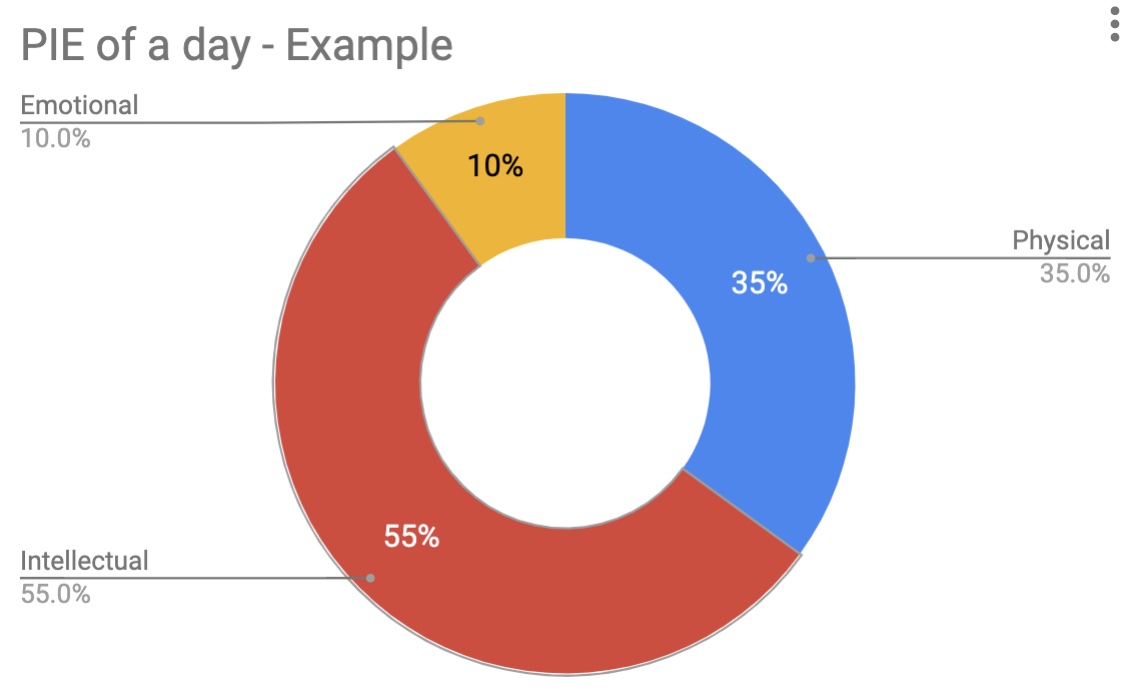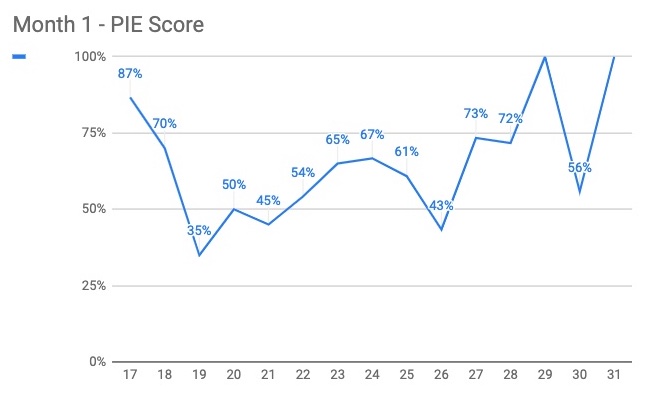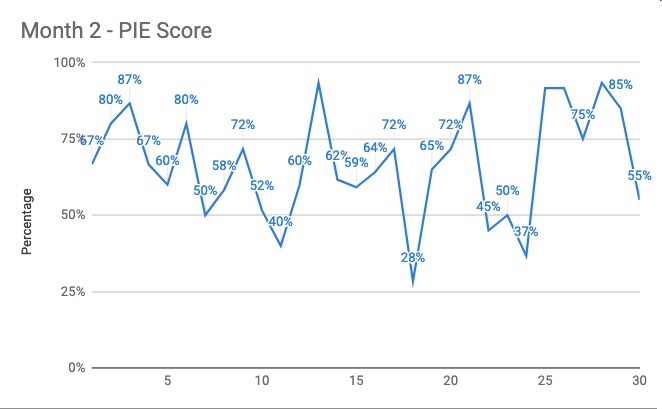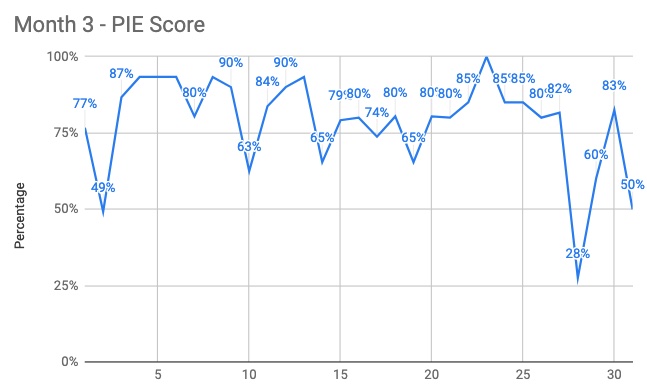PIE of a day
Posted on June 5, 2022 • 11 minutes • 2202 words
Recently, during my visit to India, I was invited to speak in a school Aurobindo Vidhyalaya Senior Secondary School headed by a visionary friend Vineetha. She and her husband GV (who is my engineering college mate) have a commendable outlook on life and one of their missions is to involve themselves in this social cause of providing value-based education in our place.
I spent an hour with the 11th graders about the opportunities ahead of them. Just to make the talk relevant, I gave the first 10 - 15 minutes for the students to ask questions so that I could get a sense of what they were really looking for. Once I captured the common themes (from more career-oriented questions like how was your first job, when did you decide that you have to choose engineering, to another end into the personal side like do you ever feel lonely, etc). I tried my best to share my perspectives in a way they can relate to. Overall, it was an interesting discussion. One of those questions was really intriguing and that was “how do you manage your day”. When this question was asked, I really liked it and I marked it as important. But, as we spent time on other themes, I was not able to get to this at all.
I had some interesting views on that to talk about as I had done an interesting experiment on that, but, I could not I had to wrap up the discussion in a hour.
So, I thought of capturing it in this article.
**
Around mid of March 2020, most of the states in the US enforced lockdowns to contain the spread of Covid. I am sure that most of us have not seen such a dire situation like that before. At least in the US, we were able to get out of the house to go for a walk. After a few weeks, around the May timeframe, while we were still in the lockdown period, there were wildfires around our place and the air quality was very poor. We were literally forced to stay indoors for a few weeks. And I never forget the gloomy orange scary sky due to the smoke overall in our areas.

“Do you run the day or the day runs you”? is a catchy question I heard in the past. I see this as a very apt way to explain those indoor days. We were forced to run the day ourselves. Otherwise, in regular times, it is very usual (not desirable, though) that the day runs us. Family, societal, and worldly commitments already fill our calendars. So, we were busy all day. Before that, I used to think, if at all I had time, I would do this and do that. Lack of time was to blame. Suddenly, I had all the time for myself because all the outdoor activities, commute to work, dropping kids to school, and even stepping out to buy groceries, were stopped. All the time I used to spend on these was available for me and my family. That’s when the reality hits. I felt very unenthusiastic and I see the days just pass by and all I did was related to the regular professional work (by staying in my chair for the entire day) and when I sign off from work, I used to watch the regular Covid news and it was again depressing. Net of it, for a few weeks, it was a very dull and humdrum sort of life. Once the wildfire was subsidized, we were able to get out of the house and go for small walks, but, still ended up in the same daily routines. We knew that this situation lasted for a long time.
I learned one thing from this whole experience. Lack of time is not the problem for many of us that stop us from doing the things we want to do. It is the lack of focus. It is the lack of purpose. With this understanding, I wanted to do an experiment to “plan” my day meticulously. I was inspired by the news that Elon Musk split his day into 5 min blocks. It sounded too unrealistic and of course, he denied those rumours. However, reading about it reinforced the fact that unless otherwise, we plan our day, it is very natural that we fall into the trap of the day that runs us.
Great. I want to plan my day. That’s fine. But, what to plan for? What do I want to achieve by this planning? My answer to this is.. I should be focusing on my overall well-being.
We, humans, are the most complex creatures when it comes to needs and demands. We generally do not settle with just food, cloth, and shelter. Yes, these are our basic needs, but, on top of these basic needs, it gets complex when we add the layer of our wants and desires. In both wants and needs, mundane life or templatized routines work against an individual who wants to thrive. I explained here why you should be template phobic.
The basic constructs of well-being
That’s how I arrived at the simple metaphor that encapsulates the basic constructs of well-being, that is, the Physical, Intellectual and Emotional state, abbreviated as PIE .

With this aspect in mind, my next step was to find a way to put this into practice. However, I needed an algorithm. Hey, don’t blame me. I am an engineer.
After a few iterations, this is what I did. First I listed what my PIE goals are.
These are some of the items I was focusing on in each of the categories and their weights (higher the weight, more is the importance).
- Physical: Ensure at least 6 hours of good sleep (Weight: 10, means non-negotiable), 1 to 1.5 hours of good outdoor activity (Weight: 7), and preferably active exercise like yoga, walking, running, or biking.
- Intellectual: Learn something new at work, jot down new futuristic ideas that can be developed or watch at least one tech talk on the domain I am focusing on (Weight: 10, non-negotiable). This could be just 30 mins or 1 hour. Just for example, for a week, my simple goal on this was, to watch a TED talk on a domain that I am most interested in, that is Wellness. And then the next one week, tips on personal finance. Or research about a topic to write. I see writing is one the best ways to refine our though process.
- Emotional: Spending quality time with my family even if it is for a short time. Walk with my daughter to school while we have interesting conversations, find opportunities to talk to my son when he goes through the stress of being in high school, help my wife in the kitchen, discuss about her career (Weight: 10, non-negotiable), read a non-technical book or article or listen to good music (Weight: 5) or call a friend or a family member to whom I have not spoken to for a long time (Weight: 3, time permits)
Next, I had to find what tools to use to track the plan.
- I used simple tools for this experiment. Google sheets for the whole planning and tracking.
- I split my day into 30-minute blocks which gave me 48 blocks in a day.
- Every day night, I plan for the following day in such a way that I fill the blocks that are already committed for my work on that day. Used Outlook <-> Google Calendar Sync tool to automatically sync my outlook calendar to my Google Calendar. And a scripted solution to push the calendar events to my spreadsheet.
- Then have a list of things to do in each of the categories (Physical, Intellectual, and Emotional) as I explained above.
- Every day night, before I plan for the next day, I update the sheet to reflect if I had met my plan, and based on a formula (do not want to get into the formula and all in this post), I get a daily score in percentage what I call PIE score for that day. I might have achieved all my goals in the “Physical” category, but, If I have not accomplished some goals in the “Intellectual” category, my overall score will be less than 100.
The Results
I started this experiment in mid of a month. The following chart shows how it went in that month. The average PIE score for the first month was 65.

This is the second month's chart. The average PIE score was 67 (+2 from the prev month). Better.

And the third month's chart. The average PIE score increased by 11 points to 78. Whoo!

Few points about these charts.
- When I was in school, any score below 90 out of 100 was considered worthless. :). So, when I first see my scores like 35, 25, etc, I see that as a failure.
- However, I had to look at the data logically, taking away the emotions and judgments I carry from my school days to understand that a low score for a day does not necessarily mean I was sitting and doing nothing. It was not a failure either. Most of the time, it means, that day, the activity was skewed towards doing things primarily on one of the categories. For example, on a day when I was busy from 6 AM to 7 PM for work-related activity, and I was not able to do any exercise or spend time with my family, or friends, then it is not a balanced day. And it is OK to have some days like that. But if that trend (i mean, low scores) continues for a week, then it is not good. Time to see what can be done differently. What if this is the trend that goes on for a month or 3 months? Oh boy! that is an alarm.
- Higher the score, the more balanced the day was in doing things that improve my Physical, Intellectual, and Emotional well-being.
- I see that on most of my weekends during this experiment phase, my scores were high. That is good, because, I was able to plan and execute well on that plan. - Also, I see that I was getting better over a period of time (1st month to 3rd month).
The Aha moments
I heard many times that there is magic in writing your goals. If you write what you want and keep it in front of you, naturally, you tend to at least think about it or the best case do something about it, even in smaller steps. I could experience it in this experiment.
Actually, this way of planning helped me a lot in doing things that I used to generally postpone in the past. Like doing the smog test for the car. I used to wait for a perfect day for this in the past. But now, when I see my chart, I see a 30 mins slot that is available in the mid of the day, say after lunch. I use that time to drop the car at the smog station nearby. And I find another slot to walk to the station so that the fulfills my outdoor exercise goal as well. In summary, I see a lot of tasks were getting done.
**
Obviously, this experiment was tailored to my needs. Say, a student, who is a teenager may have completely different priorities. He/She may need 8 hours of good sleep, and not have 1.5 hours for outdoor activity, etc. But, I strongly believe that the basic constructs of well-being apply to everyone. The weights may change, and the actual activity may change, but, the framework is the same.
Watching my son who is in high school now, I can tell the amount of stress they go through because of the system, social pressures, etc. Finding a good way to manage stress should be a planned regular activity. My son started learning piano when he was 5 and growing up, when we saw some interest in him in teaching others, we were able to help him bootstrap and start his piano teaching career when he was 12. In hindsight, I see that as one of the best things that happened to him. On a given week, this gave him an opportunity to spend 2 to 3 hours time on music which he love the most. That was a big stress buster for him. While we knew it was important for him to focus on his studies when he moved to higher grades, we did not ask him to stop it and he also see a value in continuing it. That is one of the things he focuses on for his emotional category.
After all, I believe that the important thing to realize is that life is not about just one thing, be it a career, building wealth, etc or we do not do justice for our precious lives if we just focus on recreational things alone that adds no meaningful value to oneself or to the society.
So, focus on the PIE of your day.
